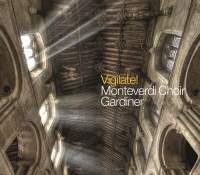Texte paru dans: / Appeared in:
*

GRAMOPHONE (08/2014)
Pour s'abonner /
Subscription information
Soli Deo Gratia
SDG720

Code-barres / Barcode : 0843183072026
Reviewer: Fabrice Fitch
It is rare nowadays for the Monteverdi Choir to venture as early as the English Renaissance; and it is equally rare to hear a motet recital of this period sung by an ensemble that is so audibly a mixed choir with a forceful personality at the helm. This is potentially a very positive attribute; at any rate it makes a change from the conformity of interpretation observable in this repertory in particular. Certain decisions regarding dynamics or articulation (the nearly constant piano for Byrd’s Civitas sancti tui or the clipped staccato of Peter Philips’s Ecce vicit Leo) are applied with a single-mindedness almost startlingly out of the ordinary.
Refreshing
on one level, this very directed approach seems a throwback to another age,
except in terms of the singers’ vocal technique. Tallis’s Suscipe quaeso Domine
calls attention to an inherent pitfall: while in homophonic passages phrasing
and articulation are very incisive, in denser polyphonic sections one senses
hesitancy, as though the singers were uncertain how far to shape their own lines
within or against the prevailing dynamic. The ending is surprisingly scrappy.
White’s set of Lamentations is similarly tentative. At the reduced verse ‘Omnis
populis eius’, and even more at ‘O vos omnes’, tempi seem too slow for the
soloists to shape their lines effectively. When the full ensemble enters, the
exaggerated elocution at ‘in die irae furoris sui’ underlines the lack of
definition of what precedes. The choir is at its most assured when contrapuntal
lines tend in the same direction or when homophony prevails. The concluding
‘Amen’ of Tomkins’s Almighty God, the fountain of all wisdom does conclude the
recital with a ravishing vignette. And speaking of bookends, the label’s
sumptuous production values extend to some stunningly evocative photographs of
woodcarving from 15th-century churches.
Cliquez l'un ou l'autre
bouton pour découvrir bien d'autres critiques de CD
Click either button for many other reviews


